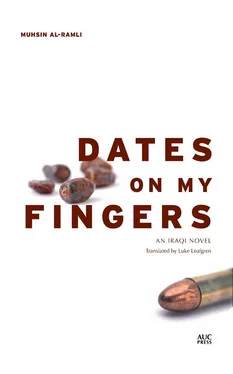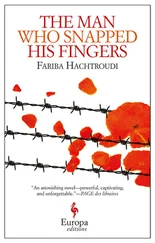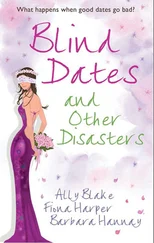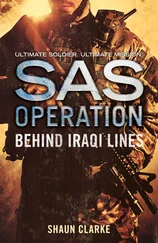I heard my name as I was being carried: “Saleem Noah al-Qashmar.” Then I was thrown on the ground, and pain shot through my back.
When I regained consciousness, my mother said to me, “We thought you were dead, and that they were announcing the names of the bodies. We couldn’t say a thing, we were so afraid.”
“And Grandfather?” I asked.
She said, “He’s fine. They didn’t beat him too much. But they shaved his beard, his mustache, and his hair like everyone else.”
We learned the following day that three of our men had been killed — Grandfather said “martyred”—in the clashes in the smoke in front of the provincial government building, while none of the police were injured. On the third day, we (the young men, at least) were able to get up and move around. I immediately visited Grandfather and had never seen him stronger or more angry. He was thinking of getting in touch with his friends among the elders of the other tribes and villages, men who had learned the Qur’an with him from Mullah Abd al-Hamid. He was also thinking about contacting his friends among the elders of the Kurdish tribes in Makhmur and Arbil, and the Turkish tribes in Kirkuk, and the Shabak people in al-Guwayr, and his Yazidi friends in Sinjar, who were tied to him by a long-lasting relationship of trust from his days as an onion merchant. Likewise, old friends among the Christians in Qarqush and Talkayf, who fought with him during the days of the British occupation. He thought of the chiefs of Najaf and Karbala, whom he had met when he used to travel there to acquire books, as well as his friends in Basra from his days of working in the docks there.
Grandfather was thinking of attacking again, and it seemed that the government had learned of these preparations, for they returned my father to Subh the next morning. His hair, beard, and mustache had been shaved, and his left leg was crippled: the foot was twisted and swollen with burns because they had applied electricity so many times. When he had begged them at least to transfer the wire to the right foot, they had put it on his testicles until they burned. The healing took a long time. When Noah did heal, he had become lame, and he never again fathered a child after the six of us. He gave up his dream of having twelve children.
Grandfather said to him, “He bit you.”
My father replied, “I will bite him.”
“How?” Grandfather asked.
My father took out of his pocket a bullet from the Tikrit boy’s pistol, which he would later make into a keychain. He said, “I’ll stick the remaining bullet in it.” (He said “in it,” and not “in his ass,” because he would never, ever, dare breathe a coarse word in front of Grandfather.) “I will shave his head and his mustache, and I will tattoo or burn ‘Qashmar’ onto his forehead.”
Grandfather said, “When?”
“I don’t know. But I will most certainly do it.”
Grandfather brought him a Qur’an and said,“Swear on this.”
So my father put his hand on the book and took an oath, feeling satisfied in what he had resolved to do when he heard the satisfaction in Grandfather’s voice. My father added, “The Bedouin man took his vengeance after forty years, and he said, ‘I have made good time.’” My father was trying to show the seriousness of his resolve to fulfill his oath, however long it took.
Later on, we noticed the other families of the village, those who did not belong to our tribe, had begun to call us by our family nicknames, such as “Father of Saleem,” or “Son of Noah,” and not by our surnames, which was the usual way of things. Moreover, we realized that they did it only in front of us, out of respect for our feelings or else fearing a violent response. Their children, however, openly called our children “Qashmars” whenever there were quarrels, and they themselves, in our absence, used the official surname that the government had registered for us. So Grandfather, who hated hypocrisy, decided we would set off for a place all our own.
He spent a week thinking over the matter, gazing out the window of his sitting room at the Tigris River and Mount Makhul rising on the opposite bank, and repeating prayers for guidance before going to sleep. Then he said, “There.”
During the night, we gathered all our belongings and put them in boats. When we reached the middle of the river, Grandfather called out to us, “Throw out every radio and television! Tear up all government documents and cast them in the river!”
We did so, feeling as though we were being liberated from some obscure burden that had been choking us. A woman trilled in joy when she saw how eagerly the men responded, and when she heard their remarks, such as the man who said, mockingly, “The river will carry our shredded papers down to them, and they can squeeze them out to make their tea!” He laughed, and everyone else did too.
We were fewer than one hundred people, together with several cats, dogs, chickens, and donkeys, and one horse. When we reached the shore and drew our boats up on the sand to secure them, we all stood under the moonlight and looked around. We were surrounded by the sound of waves, the rustling of trees, the howling of jackals, the croaking of frogs, and the chirping of grasshoppers in the nearby thickets.
Grandfather proclaimed, “O people of Mutlaq, be united as one! Show each other compassion, care for each other, and tend to your women and your flocks. Watch out for the hypocrites in the government: do not believe them, do not make friends with them, and do not allow any marriage ties with them. Build your world here according to what God wants and what you want. Do not ask the government for any documents or alms or property. As for the fuel and the medicine you need, barter for it with the people of Subh, but do not engage them in conversation, and do not ask them about anything at all.
“Never forget your vengeance!” (He looked at my father as he said this.) “When the number of your men exceeds seventy — the number of the Prophet’s companions in the Battle of Badr and the number of his grandson Hussein’s companions at Karbala — start blowing up the pillars of government! Strike them with an iron fist, wherever you are able! Bear patiently the disgrace of your surname Qashmar until you take revenge. For I fear you would forget your rightful claim if you forgot the insulting name.
“Let the Qur’an be your school; let hunting and swimming be your sport; let the truth guide your words; let freedom be your goal; let patience be your mode of life; let honesty be your language; let work be your habit; and let remembrance be your rule! Do not lie down to sleep before you absolutely need to. I declare it unlawful for you to eat food made in factories, to work for the tyrannical government, to wear the uniform of the police, or to spill each other’s blood.
“Now come! Let us build a village that we will call Qashmars today so that we will not forget. And after the vengeance, we will call it Freedmen, or Dignity, or The Absolute. O God, maintain our love for freedom and for human dignity. Kill us as you want or as we want, not as our enemies want! Amen, O Lord of the worlds!”
We all responded, according to the ritual, and with all our hearts, “Amen!”
In the silence of the night, the echo reverberated off the mountain, the forest, and the bend in the river. An “Amen!” swelling like the voice of millions of pilgrims or an army preparing for war. Our fervor and the majesty of the echo intensified Grandfather’s zeal. He continued the prayer, leaving us a space of silence after each phrase for us to give it our “Amen!”
“O God, we seek your protection from weakness and sloth. (Amen!)
“We seek your protection from cowardice and greed. (Amen!)
Читать дальше












